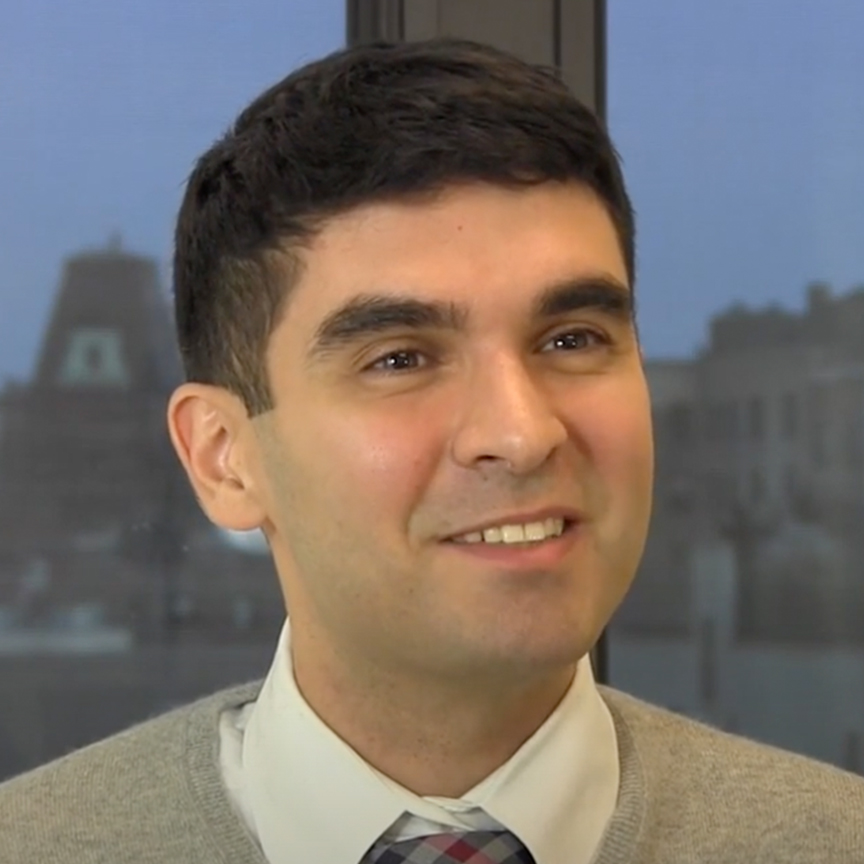Progressive Leadership Program – MSEd, EdM
Are you ready to become a changemaker for equity, social justice, and excellence in education?
Tell us about yourself.
Connect with our enrollment team and learn more about Bank Street’s online graduate programs.
Progressive Leadership Program Overview
Bank Street’s Progressive Leadership Program is a master’s degree program in educational leadership designed for passionate educators who want to effect positive change by preparing for a range of leadership roles at the school, district, state, and national levels.
For more than three decades, Bank Street has prepared aspiring leaders like you to make real change. We designed the 100 percent online curriculum to be interactive, customized, and hands-on. The courses and supervised fieldwork are grounded in constructivist pedagogy, ensuring that experiential, humanizing, and liberatory leadership is not merely a concept, but is actively practiced.
Throughout your educational journey, you will be supported by an expert team of Bank Street faculty and advisors who are current and former school leaders. You’ll work closely with an on-site mentor, engage in one-on-one sessions with a dedicated faculty advisor, and meet weekly with a small peer advisory group to discuss and develop your learning experiences during fieldwork.
Progressive Leadership Program students will hone skills in:
- Current and historical administrative practices and theories for creating culturally responsive learning environments
- Organizational development and the relationship between school management and instructional leadership
- Current school reform efforts and change processes that lead to staff empowerment and enhancing school effectiveness
- The roles and functions of the school leader in curriculum and instruction development
- Many topics, including adult development, action research, education policy and law, diversity and equity
This program is for you if:
- You are an experienced educator ready to make a difference through leadership.
- You want to work as a progressive school leader.
- You want to build on your skills to address the challenges of education reform within schools.
- You want to earn your Master of Science in Education or a Master of Education (if you have a prior master’s degree).
Request more information now to take the next step in building your legacy of educational justice.
Progressive Leadership Program at a Glance
00
Courses
00
Years*
*Average time to degree completion. Total time to complete the program may vary based on the number of credits taken each semester.
Supervised Fieldwork
Conference Group Seminars
Program Comparison:
What’s the Difference Between the MSEd and EdM?
Interested in the Progressive Leadership Program but not sure which master’s degree is the right fit for you? The Master of Science in Education (MSEd) degree is ideal for current or former classroom teachers without an existing master’s degree, whereas the Master of Education (EdM) is an advanced master’s degree in education designed for students who already possess an education master’s degree.
Curriculum
Course Requirements
Students will examine the developmental periods of young, middle, and later years in the human life cycle, with a broad multicultural approach to learning and development. Studies and research are reviewed. Emphasis is given to developmental characteristics that have implications for professional growth and development.
This course focuses on the roles and functions of the school leader in the spheres of curriculum and instruction. It covers the principles and processes that inform curriculum development and their impact on student learning. By explicitly addressing the relationship between curriculum and instruction to critical theory and pedagogy, students will connect positionality to their professional noticing. At the same time, students will unpack educational equity to become discerning consumers and negotiators of curriculum. In this course, students will envision and conceptualize ways to ensure that all students experience a liberating curriculum by focusing intensively on the knowledge and tools needed to recognize and dismantle dehumanizing spaces that are emblematic of historic and contemporary systems and structures. Finally, the course explores critical issues in leadership in curriculum and instruction and is designed to connect theory to practice as a means of inspiring, guiding, and effecting school change.
Education policy is examined in the context of historical, philosophical, economic, sociocultural, political, and legal perspectives. Leadership theory and practices that create learning environments responsive to the multicultural constituencies of schools, as well as the laws that sustain them, are analyzed.
This course examines theory, research, and practice related to organizational development. It covers a wide range of issues related to capacity-building, school vision and culture, and problem solving, and focuses on the relationship between school management and instructional leadership. Students have opportunities to integrate theory and research with administrative practice through readings, small-group work, simulation experiences, observations, interviews, protocols, and case studies.
Current school reform efforts emphasize vision, shared decision making, professional autonomy, positive school structure, and restructuring. How are these concepts being realized in current practice? What choices and constraints accompany the processes of change and staff empowerment? In this course students examine the concepts which face principals in enhancing the effectiveness of schools, as well as the competencies of planning, joint decision making, problem solving, and negotiation. Course work complements and is tailored to the Principals Institute internship experience.
Designed for students who are preparing for supervisory roles or who are actively engaged in such roles, this course focuses on the objectives, functions, and evaluation of the supervisory experience within multicultural educational institutions. Organizational, cultural, and human variables that may facilitate or impede effective supervision are identified, and strategies to maximize or minimize their impact are generated. Supervisory attitudes and skills aimed at increasing professional growth in individual and group supervision are synthesized from a variety of supervisory models, with particular attention given to the clinical supervision model.
This course is designed to enable leaders, teachers, special educators, and others to be effective consumers of research, as well as to plan and carry out research in response to specific educational questions. Stages of the research process are discussed. Students analyze and evaluate research in the areas of leadership, school effectiveness, administration and supervision, teaching, and curriculum reform, and apply the findings to their everyday roles as educational leaders. It is expected that this course will be valuable for those matriculated students who are initiating projects to satisfy the Independent Study requirement. The format consists of lectures and discussions of the stages of the research process. Class members participate in a project involving research design, data collection, and analysis.
This course is designed to explore school-based budgeting and fiscal management. The course will provide an overview of the various resources that schools receive and the rules that govern their use. There will be examples of how various schools use these resources, and a discussion of some of the considerations that school leaders may need to take into account in order for them to effectively implement the educational goals and objectives for their schools.
This course meets New York State certification requirements for School Building Leadership (SBL) internship experiences. Through close work with a faculty advisor and peers, participants apply their learning from coursework to their field experiences, integrating theory and practice as they reflect on their own professional development. Interns work with a site supervisor and are given substantial school-based responsibilities that involve direct interaction and involvement with staff, students, families, and community leaders. Participants develop the capacity to build and support a positive school culture, build teams, enlist collaboration, and plan and sustain change efforts. Graduate students in advisement participate in small-group sessions with their advisors. At the end of supervised fieldwork, each candidate presents a comprehensive portfolio of internship experiences which meets the program’s Integrative Master’s Project requirement.
TOTAL CREDITS: 31
*Completion or evidence of completion of the three New York State mandated workshops in Child Abuse Identification, School Violence Prevention (SAVE), and Dignity for All Students (DASA) is required for graduation.
The Online Learning Experience
Weekly Breakdown per Course
Up to 6 Hours per Week
Synchronous
- Conference group meetings (8 per semester)
- Course sessions (5– 8 per semester)
- Session dates are posted at start of semester
+
Up to 10 Hours per Week
Asynchronous Assignments and Reading
Assignments and workload are variable depending on the course. Instructors try to spread out the demands while maintaining the richness of materials and experiences.
+
11 Hours per Week
Supervised Field Work
This includes logged leadership experiences at the school site, including committee work, coaching, teams, planning, meetings, and more performed during and beyond regular work hours.
=
27 Total Hours per Course
Career Outcomes for Progressive Leadership Graduates
If you enroll in Bank Street’s online Progressive Leadership Program, you will earn a Master of Science in Education (MSEd) or a Master of Education (EdM). With this degree, you are preparing to serve your community in a variety of roles. Whether you’re interested in pursuing the path to principalship or district leadership positions, we can help you achieve those goals.
Possible career outcomes include:

Elementary, middle, and high school principals
- Annual mean national salary: $111,020
- Annual mean New York State salary: $145,530
- Annual mean New York City metro area salary: $152,780

Elementary and secondary school administrators
- Annual mean national salary: $111,020
- Annual mean New York State salary: $145,530
- Annual mean New York City metro area salary: $152,780

College, university, and professional school administrators
- Annual mean national salary: $122,010
- Annual mean New York State salary: $166,500
- Annual mean New York City metro area salary: $165,010
Source: U.S. Bureau of Labor Statistics, 2024
Note: Salaries can vary based on several factors, including location, educational setting, and level of experience.
Program Admissions
Bank Street Graduate School of Education seeks applicants who demonstrate the following:
- Employment as a teacher or pupil personnel provider
- Excellent academic record and references reflecting strong leadership potential
- For New York State SBL certification, successful completion of three years of teaching or pupil personnel service work in N–12 settings
- One letter of recommendation from a current supervisor (assistant principal, principal, site director, head of school, etc.)

Meet Our Alumni
“The institute gave me a chance to sit down with our colleagues and professors and have a space to dream, to really think about where I can make the most change. I was well prepared to tackle the challenges I face as a principal in New York City.”
Dave Baiz
GSE ’13
Is the Progressive Leadership Program the right fit for your goals?
Contact a member of our team today to learn more about our online degree program and how it can support your career growth.
Contact UsTell us about yourself.
Connect with our enrollment team and learn more about Bank Street’s online graduate programs.